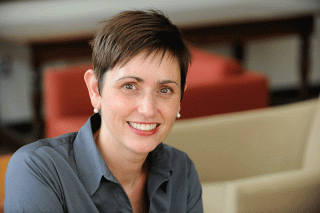In a very short time period, many nations will become "super-aged" societies, meaning over 20% of the population is 65 and older. The United States is on target to reach this proportion by about 2030 with more than 77 million older adults. The U.S. Census has projected that this population will be larger in total size than the population of those who are 18 and under. Other nations, like Spain and Italy, are already over the 20% threshold. By 2050, U.N. projections show Japan, South Korea, Spain, Italy, Portugal, China, Singapore, Hong Kong, and Poland with 40% of their populations over the age of 60.
“There is an acute shortage of social work scholars studying aging and older adults,” says Professor Michelle Putnam, Editor-in-Chief for the Journal of Gerontological Social Work (JGSW). “Compared to the population’s size, it's a bit ridiculous how little attention is given to this area of practice.”
Gerontological social work is a small field, with a modest scientific knowledge base. For the JGSW and gerontological social work, future challenges include gaining more national and international attention to this field.
“There are so many competing areas of need,” says Putnam. “Social work itself is an incredibly rich and diverse field. That said, only about 5% of MSW students graduate with any training at all in gerontology or having worked with older adults. This is completely out of proportion to the population. Social work as a profession is not producing professionals prepared to work with older adults.“
Over the last few decades, there has been an influx of information about the aging population — but the field of social work has shown minimal interest. Putnam notes that the continued neglect of this subject is, in a word, "ageist." Although drawing attention to the needs of older adults is a significant challenge, the JGSW is working to provide this evidence to the social work field.
The JGSW is the only English-language journal focused on aging and social work and is actively working to draw attention to this subfield. Since 2014, Putnam has served as JGSW’s Editor-in-Chief, working to improve the quality and rigor of manuscripts published by the journal. She has also widened the range of topics the journal publishes and increased the number of international authors.
“In collaboration with Taylor & Francis, our publisher, the JGSW editorial staff has worked to diversify the editorial board, engage in strategic marketing efforts, and increase the visibility of JGSW," explains Putnam. "Through these efforts, we were able to move JGSW into a better strategic position in the domain of health and social care journals.”
Engaging an international audience is key to the success of the journal, and the field. “Social work is practiced differently in different nations depending on where social work is in the professional spectrum, how the social welfare system is structured, the advancement of civil society, and the financial state of the society, among other things,” says Putnam. “JGSW authors highlight the range of social work practiced globally.”
The Journal has authors from nations like Sweden, the U.K., and the U.S. with extensive but quite varied social work workforces and social welfare systems. It also has authors writing from nations with little established social policy infrastructure and with a limited professional social work workforce, like Tunisia.
“The field needs more scholarship and research to create a strong evidence base. Older adults are an incredibly heterogeneous group," explains Putnam, "their long lives mean they have had complex and varied histories that they bring with them into their later decades. The knowledge base must also be diverse and have some depth. We're working towards that in the field, but there is a long way to go.”
But they have made progress. In 2017, the JGSW was awarded an Impact Factor by Thompson & Reuters of .69. In 2018 it raised its Impact Factor to .859. “That's a big jump for one year,” says Putnam. “Much of this success is attributed to the quality of work we are publishing now, but also the wide scope of work and our broad readership. That said, while we are proud to have a rising Impact Factor, it is more important that our articles are read. In 2018, JGSW articles were downloaded more than 80,000 times. That’s a lot for a niche journal.”
As 2020 will be her final year as Editor-in-Chief, Putnam has begun to transition out of the role. “The next step for JGSW is to expand its editorial staff to add the position of Associate Editor in addition to the Editor-in-Chief. This new role reflects not only the volume of manuscripts we receive but also the international range of authors, and the need to add expertise in locating reviewers and evaluation manuscripts from across the globe.”

